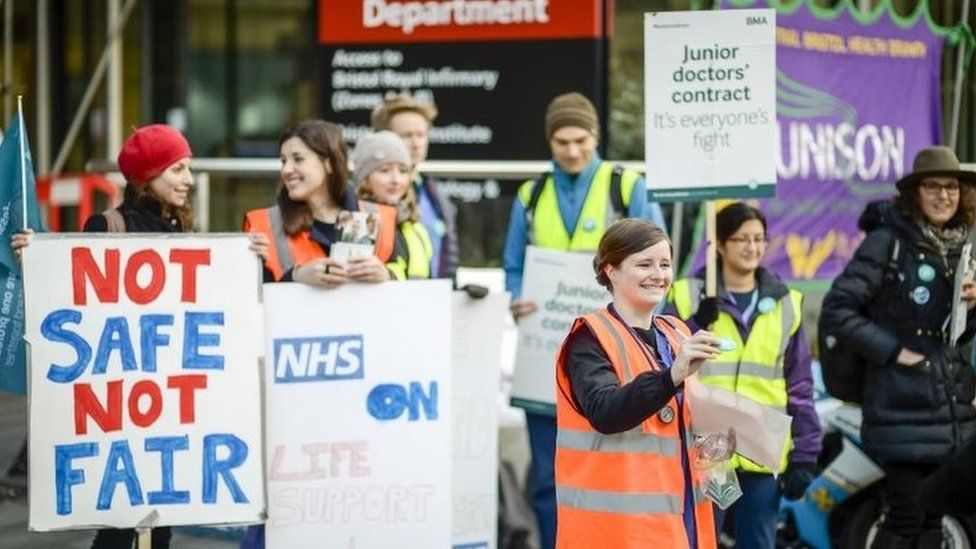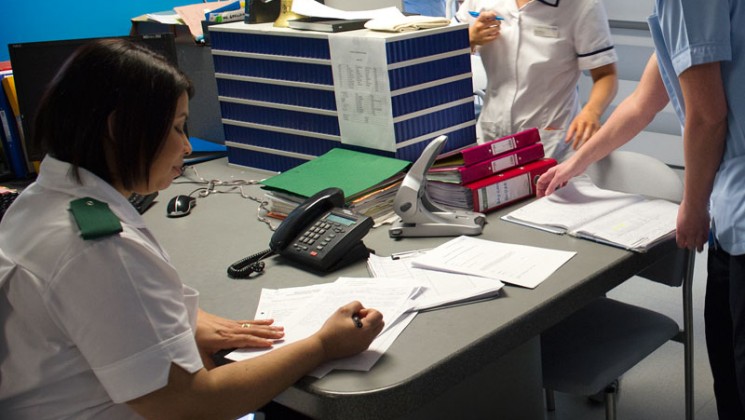Health
Senior doctors in Wales vote to strike over pay

- A 48 hour strike will take place from Tuesday 16 April
CONSULTANTS and SAS (specialist, associate specialist, and speciality) doctors have voted to strike as part of a dispute with the Welsh Government over their pay, which has been cut by almost a third in real terms since 2008/9.
The results of the ballots, which ended at midday today (Monday 4 March), for doctors working in both branches of practice in Wales saw 86% of consultant voters and 94% SAS doctor voters cast their ballots in favour of industrial action.
A significant 70% of consultants and 58% SAS doctors eligible to vote in Wales had responded to a call to take part in industrial action which will take place from Tuesday 16 April.
Consultant and SAS doctors make up over half (54%) of the hospital-based medical workforce combined, with 3,137 Consultants and 1,088 SAS doctors working in hospitals across Wales. *
The BMA is now calling on all consultants and SAS doctors in Wales to participate in a 48 hour strike, except for those providing ‘Christmas day’ cover.
This level of cover will ensure doctors can provide emergency care, but all elective or non-emergency work will be postponed during this period.
BMA Cymru Wales is working with NHS employers on precise staffing levels that are appropriate and will provide guidance to members in advance of any strike days.
Dr Stephen Kelly, chair of the BMA’s consultants committee in Wales, said:
“This has been an incredibly difficult decision. No doctor wants to strike, but the conditions now faced in the workplace caused by the extreme pressures on the service and unsafe staffing levels have left doctors with no choice.
“Fewer doctors now want to develop their careers in Wales with some health boards reporting vacancy rates of over third for senior doctor posts.
“Colleagues are now choosing to retire early, reduce their hours or move out of Wales where pay is competitive, and wards better staffed.
“Unless doctors are better valued for the work they do, more and more doctors will leave an NHS already under severe pressure in Wales”.
Dr Julie Jones, Deputy chair of the BMA’s SAS doctors committee in Wales added: “Doctors are burning out from covering significant gaps in the workforce and patient safety is at risk. With this result our members have chosen to take a stand for the profession and for patients.
“People are waiting for treatment for longer than ever before, resulting in poorer outcomes and more time in the hospital and we all deserve better.
“This result represents a profession that is not ready to give up on the NHS and its patients in Wales”.
The decision to ballot members was taken after the BMA rejected the Welsh Government’s first and final pay offer for the 2023/24 financial year for those working in secondary care.
For consultants and SAS doctors on closed contracts the offer was 5%; SAS doctors on more recent contracts received as little as 2.5%. This final offer left BMA Cymru Wales with no choice but to enter a trade dispute and ballot for strike action.
Over the last 15 years, consultants and SAS doctors in Wales have experienced a pay cut of almost a third since 2008/9. They received another sub-inflationary pay offer from the Welsh Government for 2023/24 which is below the recommendation made by the DDRB and is the worst offer in the UK.
The BMA is calling on the Welsh Government to provide sufficient funding to enable discussions around an uplift in senior doctor pay that will retain existing doctors and ensure that we are able to recruit more.
Consultant and SAS doctor strike action will take place from 7am, Tuesday 16 April to 7am, Thursday 18 April.
Junior doctors in Wales will begin their third round of strike action a 96-hour full walkout from 7am Monday 25 March in pursuit of a fairer deal for their service.
Commenting on consultants and specialist, associate specialist and speciality (SAS) doctors in Wales voting for two days of strike action in April, Russell George MS, Welsh Conservative Shadow Health Minister said:
“Yet more strikes, this time from senior doctors in Labour-run Wales, will place further pressure on the longest waiting lists in the UK.
“While Conservatives in England put forward substantially higher pay offers for speciality and junior doctors, Labour has consistently put the worst offer in the UK on the table.
“The Welsh Conservatives would spend the full Barnett uplift received for health on health and would at least match the independent recommendation, which Labour has failed to meet, instead of following Labour and Plaid’s plans to create 36 more politicians.”
Health
Health board targets rise in steroid and gym drug use across west Wales

THE LOCAL health board has launched new targeted measures after recording a sharp rise in the use of steroids and other image-enhancing drugs across the region.
Hywel Dda University Health Board says needle exchange figures show significant growth over the past two years in people seeking support related to Image and Performance Enhancing Drugs (IPEDs), including anabolic steroids and so-called Selective Androgen Receptor Modulators (SARMs).
SARMs, while marketed online as safer alternatives to steroids, are illegal to sell in the UK and health professionals warn they carry serious and largely unknown risks.
The health board has now teamed up with Dyfed Drug and Alcohol Service (DDAS) and Choices, a young people’s substance use service, to tackle what officials describe as an “emerging public health challenge”.
Workshops and outreach
Two key initiatives have been introduced.
Educational workshops are being delivered to young people, focusing on the risks of using performance-enhancing substances during physical development and the potential long-term effects on hormones, mental health and fertility.
At the same time, enhanced support is being offered to people already involved in gym and fitness culture, with harm-reduction advice, health monitoring and confidential drop-in services.
Support includes testosterone testing, blood checks, cycle provision kits and discreet one-to-one consultations.
One service user described the programme as “quick, professional and non-judgemental”.
They said: “The drop-in clinic for my blood test was really convenient. I was seen quickly and given a full run-down of the services available. The staff made me feel comfortable the whole time and I got my results back faster than expected.”
Taking support into the community
The team has also worked directly with local gyms, leisure centres and sports venues, speaking to more than 100 people during five outreach sessions.
Twelve DDAS staff members have completed specialist IPED training delivered by Public Health Wales to strengthen expertise within the service.
Rachel Wilson, Resilient Families Manager at Choices, said the aim is to reduce stigma.
She said: “We’re proud to work alongside Hywel Dda to ensure people who use IPEDs are met with understanding, not judgement. These initiatives are helping us reach individuals who may not have previously considered accessing support.”
Craig Jones, Prevention and Population Health Improvement Manager, added: “This work is about meeting people where they are. By listening and responding with compassion and evidence-based care, we’re making a real difference.”
Dr Ardiana Gjini, Executive Director of Public Health, said the approach showed the board’s commitment to early intervention.
She said: “These initiatives reflect a proactive, collaborative response to emerging health challenges and demonstrate our dedication to protecting the health of our communities.”
Anyone seeking confidential advice or support can contact DDAS on 03303 639997 to book an appointment.
Health
Nurses warn of pay and burnout crisis as new report exposes pressures in Wales

A NEW national report has laid bare the growing pressures facing nurses and midwives in Wales, with concerns over pay, burnout and lack of professional development threatening the long-term future of the workforce.
The findings, published by the Nursing and Midwifery Council in its Spotlight on Nursing and Midwifery 2025 report, show that while many nurses remain deeply committed to their roles, large numbers feel undervalued, overstretched and reluctant to recommend the profession to others.
Responding to the report, Royal College of Nursing Wales said the data should act as a wake-up call for government and health boards.
Professor Sandy Harding, Associate Director of Nursing, Policy and Professional Development at RCN Wales, said:
“We welcome the determination and commitment shown by our existing nurses in Wales, with more than half surveyed saying they are satisfied with their day-to-day work and motivated by making a difference to people’s lives. However, the findings also present a stark reflection of the poor health of nursing in Wales.
“Too many nurses are not recommending the profession to others, are struggling and are facing abuse and discrimination in the workplace.”
Pay falling behind responsibility
One of the most pressing concerns raised in the report is pay.
Nursing leaders say salaries have failed to keep pace with the growing complexity of the job, heavier caseloads and the rising cost of living, leaving many staff feeling undervalued and financially squeezed.
For some, the pressure is forcing difficult decisions about staying in the profession or reducing hours.
RCN Wales argues that without meaningful improvements to pay, recruitment and retention will continue to suffer, placing further strain on already stretched hospital wards, community services and care settings.
Training and career progression gaps
The report also highlights inconsistent access to continuing professional development, with many nurses struggling to secure protected time or funding for further training.
According to the union, this not only limits career progression but risks undermining patient care in the long term.
Harding said: “Access to protected time and funding for continuing professional development remains inconsistent, undermining both career progression and the sustainability of the workforce.
“RCN Wales believes this is unacceptable and we will continue to support nurses and fight for fair pay, meaningful investment in professional development and better working conditions across Wales.”
Commitment remains strong
Despite the challenges, the report does note strong dedication among nursing staff.
More than half of those surveyed said they were satisfied with their day-to-day work and remained motivated by the difference they make to patients’ lives.
Health leaders say that commitment is a strength the NHS in Wales cannot afford to lose.
With around 35,000 members in Wales, the Royal College of Nursing says it will continue pressing ministers to address what it describes as a “workforce crisis” before it deepens further.
The union is calling for fairer pay settlements, safer staffing levels and guaranteed investment in training to ensure nursing remains an attractive and sustainable career.
Health
Doctor struck off after sexual misconduct findings at Withybush Hospital

Tribunal history reveals medic was removed in 2012 for dishonesty before being allowed back to practise
A DOCTOR accused of sexually harassing junior colleagues while working at Withybush Hospital had previously been struck off the medical register for lying about his qualifications, the Herald can reveal.
Dr Velmurugan Kuppuswamy is currently at the centre of fitness-to-practise proceedings after allegations he made sexually inappropriate comments and subjected two female doctors to unwanted physical contact during his time as a locum consultant in Haverfordwest.
But records show this is not the first time his conduct has come before regulators.
In 2012, an independent tribunal found he had been dishonest during an application and interview for a postgraduate cardiology training post at an NHS deanery in England.
The panel heard he falsely claimed to have submitted a Doctor of Medicine thesis, said he was a member of the Royal College of Physicians and stated he had passed a practical clinical skills assessment.
He initially admitted misleading information before later retracting parts of his account. The tribunal concluded he had “maintained his dishonest accounts” and had wrongly accused a witness of giving misleading evidence.
He was erased from the register and returned to India, where he later worked in a cardiac hospital.
In 2020, he applied to be restored to the UK medical register.
The General Medical Council investigated and opposed the application, arguing his expressions of remorse had come years late and raising concerns about a lack of independent evidence regarding his work overseas, as well as the absence of relevant ethics training.
However, an independent Medical Practitioners Tribunal at the Medical Practitioners Tribunal Service accepted his assurances that he had changed. His evidence was described as “compelling, heartfelt and genuine”, and the panel decided a well-informed member of the public would not be concerned about his return to practise.
His name was restored to the register.
Shortly afterwards, he began working shifts as a locum consultant at Withybush Hospital, which is run by Hywel Dda University Health Board.
Within months, fresh allegations emerged.
A tribunal has heard claims that between August and September 2021 he hugged junior colleagues without consent, touched their backs and waists, squeezed their wrists and arms and made sexually suggestive remarks at a staff social event.
On two occasions, he is alleged to have gripped one doctor so tightly it caused pain and ignored her requests to stop. He is also accused of staring at female colleagues, following groups of women around the venue, making comments about their bodies and placing a hand high on one doctor’s thigh.
Further allegations relate to behaviour at work, including sitting extremely close to a colleague, draping an arm behind her on a sofa and grabbing her arm while whispering comments.
According to the charges, his conduct created “an intimidating, hostile, degrading, humiliating or offensive environment” and amounted to a sexually motivated abuse of his senior position.
Dr Kuppuswamy denies wrongdoing.
Following the investigation, the case was referred to a tribunal by the General Medical Council. The decision on his fitness to practise was made independently by a Medical Practitioners Tribunal at the Medical Practitioners Tribunal Service.
The tribunal determined his behaviour amounted to serious professional misconduct and ordered that he be erased from the medical register.
Asked whether the doctor remains employed, the health board said it does not comment on individual staffing matters.
Medical director Mark Henwood said: “We have robust policies and procedures in place to ensure the safety of both staff and patients in our care and we take seriously our responsibility for their wellbeing. We are committed to providing a safe, supportive environment where patients and staff can be confident that best practice is being followed at all times.”
-

 Crime2 days ago
Crime2 days agoSex offender jailed after living off grid in Pembrokeshire and refusing to register
-

 Health15 hours ago
Health15 hours agoHealth board targets rise in steroid and gym drug use across west Wales
-

 News3 days ago
News3 days agoPrincess of Wales visits historic Pembrokeshire woollen mill
-

 Crime7 days ago
Crime7 days agoPembroke man accused of child sex offences sent to Swansea Crown Court
-

 Health5 days ago
Health5 days agoDoctor struck off after sexual misconduct findings at Withybush Hospital
-

 Crime17 hours ago
Crime17 hours agoTeacher injured and teenager arrested for attempted murder at Milford Haven School
-

 Community7 days ago
Community7 days ago50s women threaten legal action over pension compensation refusal
-

 Education6 days ago
Education6 days agoIndustry insight helps marine cadets chart career course


























